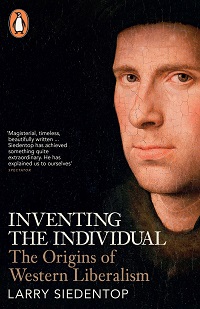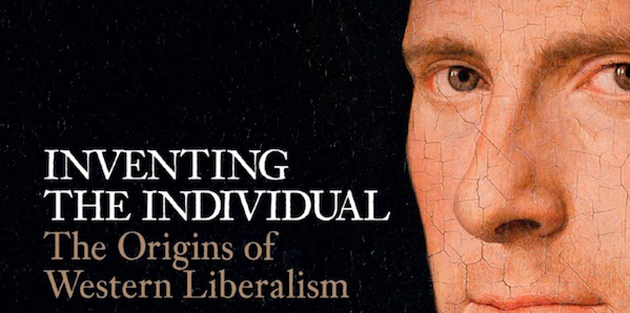Sanctifying the Individual: Does the West owe its individualism to Christianity? by Allen Mendenhall
Academics often write for themselves. Chasing tenure, promotion, and the fleeting approval of their peers, they author books that no one reads. Hyperspecialized and boring, jargon-laden and politically ineffectual, these works fail to account for the big questions that interest the educated public and inspire young students.
 Larry Siedentop, an emeritus fellow of Keble College, Oxford, is not so insular or pedantic. In Inventing the Individual, he advances a grand concept of “the West,” a totalizing signifier that has lost currency in recent decades because it implies a monolithic territory with a shared culture and linear history at odds with its turbulent, complicated past. He rejects the notion of a static or essentialized Western civilization and conventional history as written by professional historians. Instead, he outlines periods or eras according to their sociological developments. Doing so allows him to define historical figures and phases by their treatment of family, religion, property, law, government, and philosophy.
Larry Siedentop, an emeritus fellow of Keble College, Oxford, is not so insular or pedantic. In Inventing the Individual, he advances a grand concept of “the West,” a totalizing signifier that has lost currency in recent decades because it implies a monolithic territory with a shared culture and linear history at odds with its turbulent, complicated past. He rejects the notion of a static or essentialized Western civilization and conventional history as written by professional historians. Instead, he outlines periods or eras according to their sociological developments. Doing so allows him to define historical figures and phases by their treatment of family, religion, property, law, government, and philosophy.
Siedentop chides that as a consequence of following professional historians and academic trends, “we no longer have a persuasive story to tell ourselves about our origins and developments.” He sets out to tell just that kind of story, resting on two assumptions:
1. “If we are to understand the relationship between beliefs and social institutions … then we have to take a very long view.”
2.“Beliefs are … of primary importance” to the progress or regress of civilization, as demonstrated by Marxism’s infiltration of “liberal thinking” during the 20th century.
Siedentop recognizes that the world is a battleground of ideas — a proposition that seems obvious in light of the rise of Islamic fundamentalism and the “transmuting of Marxist socialism into quasi-capitalism in the world’s largest country, China.” He traces arguably the most lasting and significant idea of Western liberalism — that of the individual — from its roots in Greek and Roman antiquity to its proliferation during the Middle Ages and finally to its current manifestation in secularism. Siedentop argues that contrary to common beliefs, the Renaissance was not central to the displacement of ancient values and that “as an historiographical concept the Renaissance has been grossly inflated.” Evidence of modernity, he submits, percolated much earlier: during the 10th century.
Boldly abridging the centuries into neat conjectural paradigms, Siedentop nevertheless captures depth and detail while presenting a magisterial and impressive narrative that is also coherent, perhaps too coherent for those who believe history is anything but tidy. Siedentop disputes that Greek and Roman antiquity were, unlike their Christian posterity, characterized by political freedoms and the prizing of reason and inquiry. Antiquity was marked by a different kind of religion, rooted in kin and tribe. The distinction between public and private had not yet developed; the demarcation was instead between public and domestic.
In this time before Christianity, inequality was an unchallenged virtue, an ultimate good; all morality vested in the paterfamilias, the keeper of the clan. There were no rights as such, not even to life, at least not outside the hierarchical family unit. All human agency was directed toward the preservation and glorification of the household and the lineage of its members, in particular the dominant male hero. Devotion to the family shaped rules about property and ownership; dutiful sexual reproduction and close ties between relatives led to the growth of families and eventually to the corporate associations that, with their shared domestic practices and mores, became nascent cities.
Siedentop’s chief contribution is to show that, throughout Western history, liberty has not entailed a rejection of Christianity; there’s no historical basis for the allegation that Christianity is inherently authoritarian, statist, or illiberal. To the contrary, Christianity created the conditions necessary for economic and political liberalism to flourish, first by threatening the aristocratic models of the ancient citizen class, and second by redirecting human curiosity toward the individual soul and its afterlife. “Liberal thought is the offspring of Christianity,” Siedentop asserts, because “liberalism rests on the moral assumptions provided by Christianity.”
The teachings of Jesus of Nazareth undermined the ancient patriarchal family of the Greek and Roman models by emphasizing the moral agency of individuals and their correlative responsibilities. “For I am come to set a man at variance against his father, and the daughter against her mother, and the daughter in law against her mother in law,” Jesus declared, adding that “a man’s foes shall be they of his own household.” Such a statement would have appalled and baffled the ancients with their ancestor worship and their consecration of hearth and home.
The Apostle Paul broadened Jesus’s lessons and instructions to encompass a wider notion of justice grounded in moral equality. He championed a collaborative social order that would support, nourish, and discipline its members separately and on a case-by-case basis. Individuals, not groups, were admitted into heaven based on their personal beliefs and inner convictions. Society thus needed to motivate individual sanctification.
The gift of grace was available to anyone who chose to accept it; consequently, everyone possessed a basic dignity that legal institutions had to recognize. “The quality of individual will or disposition,” explains Siedentop, “was becoming the Christian leitmotiv. Paul’s imagery of depth had fostered the sense of a realm of conscience that demanded respect. Individual agency and divine agency were now understood as parts of a continuum.”
Siedentop’s narrative of the spread of reason and rationality and his portrayal of the doctrine of free will that gained credence within the early Christian church represent the theoretical antithesis to Nietzsche’s genealogy of morals. Whereas Nietzsche chastised Christianity for its celebration of meekness and mildness — ethics of self-negation that he considered sickly — Siedentop details the early church fathers’ strong defense of rights of conscience and freedom of worship. Whereas Nietzsche located a virile individualism in nobility and aristocracy, Siedentop sees in monasticism the emergence of consensual market associations and exchanges subject to a definite rule of law. Whereas Nietzsche characterized Christianity as a form of “slave morality” marked by ressentiment, Siedentop reveals that the competition between church and state inadvertently brought about the shifting jurisdictions, fluid boundaries, and vying claims of authority that enabled market liberalism to expand. Unlike Nietzsche, Siedentop is neither tendentious nor polemical, but the point remains: his depiction of Christian liberty is incompatible with Nietzsche’s rendering of Christians as evil and immoral, duplicitous and envious.
We are the sum of our past, the product of our combined labors through the several generations. We have inherited customs and beliefs often unwittingly and in different forms. Having survived political unrest, ideological opposition, social experimentation, and technological progress, these customs and beliefs have proven their fitness and credibility over time. The book’s title, Inventing the Individual, implies that humans have created rather than constituted individuals. The concept of the individual is not natural, timeless, universal, permanent, unchanging, or eternal; it’s a construct that needed growth and cultivation. The idea of the individual remains the West’s most defining, enduring contribution to humankind. It’s also, perhaps, the most fragile and endangered.
We forget that the ideas and values we uncritically accept were unimaginable to many of our predecessors, even in the West. Without understanding how we came to assess and promote the individual — to such an extent that we now build laws and institutions to protect our inalienable rights — we risk taking those rights for granted and losing them. Siedentop puts this profound question to his readers: “If we in the West do not understand the moral depth of our own tradition, how can we hope to shape the conversation of mankind?”
How indeed. All times and places are matters of turmoil and confusion until they have passed; then they become, in the pens of historians, inevitable. Not so with Siedentop, who puts our own moment into perspective by bringing us closer to the turmoil and confusion that created us. He helps us to appreciate why and how we do what we do and think what we think.

ABOUT ALLEN MENDENHALL
Allen Mendenhall is the author of Literature and Liberty: Essays in Libertarian Literary Criticism(Rowman & Littlefield / Lexington Books, 2014). Visit his website at AllenMendenhall.com.


